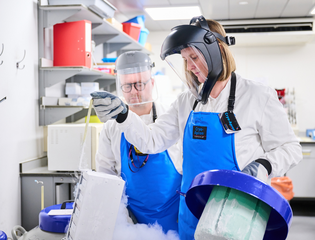Ovarian Cancer Genetic Testing Process

Tayla and her family
If you have used our risk tool and suspect your family history puts you at increased risk of cancer, we strongly recommend that you make an appointment to see your GP to discuss this, just like Tayla (pictured above) did.
At the GP
For this appointment, it's a good idea to take details of who’s had cancer in your family, what type of cancer it was and at what age they were diagnosed. Remember, genetic faults can pass down the male or female line so bring details of any cancer the men in your family may have had too.
At this appointment you can talk through your concerns and ask your GP to refer you to your nearest genetics clinic.
At the genetics clinic
The genetics clinic is where you will speak to a member of the genetic team about your family history of cancer and explore whether or not genetic testing is appropriate for you.
The appointment will last around 40 minutes.
They will ask detailed questions about your family history including how many relatives have had cancer, at what age, what types of cancer, and whether you have any Ashkenazi Jewish heritage. This is to establish whether your risk is high enough for you to be eligible for genetic testing.
Not everyone who attends a genetic clinic will be eligible for genetic testing so a referral to this team does not guarantee you will be able to have a test.
If you are to have genetic testing, NICE guideline CG164 1.5.2 recommends pre-test counselling. This allows you the opportunity to discuss the potential risk and benefits of genetic testing, the chances of finding a fault, the implications for you and your family, and the different types of test results.
You should also have the chance to ask questions to help you make the decision about whether or not you wish to have genetic testing.
If you choose to have testing
If you are eligible and decide to have the testing done, what happens next will depend on your circumstances. These genetic tests are usually conducted using blood samples. A sample of your blood will be taken and sent to a specialist lab where the test will be conducted.
If you have a living family member with cancer who has been tested and has a known gene fault, the genetics team will be able to test you for this fault. The results will take roughly two weeks.
If you have a living family member with cancer who has not been tested but is interested in finding out more, they should seek referral to their local genetics clinic so that they can begin the process themselves. If they are tested, are found to have a genetic fault and you are eligible for testing, you will then be able to be tested for this fault and the results will take around 2 weeks.
If you have no living family members with cancer, or a family member with cancer that does not wish to be tested, it is still possible to be tested for a genetic fault provided you are over the eligibility threshold. This test takes longer, as it is a much harder process to find an unknown fault. It should take 4-8 weeks but sometimes takes a lot longer.
You can usually request how you are told of the results, but this will either be face-to-face, by telephone or by letter.
Possible results of the testing
There can be benefits to genetic testing, regardless of whether a person receives a positive or a negative result.
Positive: This means a known genetic fault has been found, and you will be provided with a letter detailing exactly what that fault is.
A positive test result may bring relief by resolving uncertainty regarding future cancer risk and may allow people to make informed decisions about their future - including taking steps to reduce their cancer risk.
People who have a positive test result may choose to participate in medical research that could, in the long run, help reduce deaths from hereditary breast and ovarian cancer.
Negative: This means you do not have the gene fault(s) that you have been tested for.
The potential benefits of a true negative result include a sense of relief regarding the future risk of cancer, learning that one's children are not at risk of inheriting the family's cancer susceptibility, and the possibility that special check-ups, tests, or preventive surgeries may not be needed.
Remember, you still have the same risks of getting cancer as the general population, so be aware of the symptoms, check yourself regularly and be aware of any changes in your body.
Inconclusive / VUS: Sometimes genetic testing will not give a clear positive or negative result.
Many different faults have been identified in BRCA1/2 genes but not all have been linked with an increased risk of cancer. These faults are known as ‘variants of uncertain significance’ (VUS).
Identifying a VUS means that an abnormality has been found in your BRCA1/2 gene test, but that based on available information, the specific fault found has not been linked to an increased risk of developing cancer.
As we learn more about variants of uncertain significance some might be re-classified as being ‘clinically significant’ and hence associated with an increased risk of developing cancer. This information is constantly being updated according to NICE clinical guideline CG164 1.5.10.
If your test results show a VUS then NICE clinical guideline CG164 1.5.9 advises that you can request a review in the future to see whether your VUS has been classified as a BRCA1/2 gene fault.
If you have any questions please contact info@ovarian.org.uk


